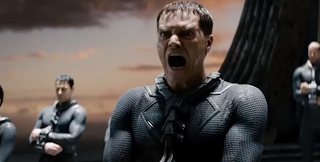‘Man Of Steel’ and Platonic Justice
‘Ware spoilers, yet this may be the best exploration you’ll read of how Man of Steel rebuts-yet-echoes Plato’s philosophy in The Republic.1
Its early scenes present the planet Krypton as a society clearly modeled on The Republic‘s principles. Each individual performs a specific function that they were genetically programmed for. This mirrors Plato’s assertion that in the ideal polis, each person should have a specific role that he or she develops or hones as thoroughly as possible.
[…] It is arguably Zod who represents the most substantial rebuttal to Plato’s Republic; his character is a nightmare vision of the polis’ governing structure gone haywire.
 And yet the dialogue character Glaucon in The Republic describes a Platonic “just man,” which the Man of Steel reflects:
And yet the dialogue character Glaucon in The Republic describes a Platonic “just man,” which the Man of Steel reflects:
His youthful acts of heroism make him appear a freak rather than a protector. In the scene where he is shown reading Plato, he is tormented by bullies but refuses to retaliate, even though his strength is sufficient to decimate them. The culmination of this dishonor comes when General Zod arrives at Earth and demands an audience with Superman. At this point, Superman voluntarily turns himself in, allowing himself to be taken away in handcuffs by the American military. He chooses the just course of action despite skepticism from humanity and disgust from Kryptonians, and even though he retains the power to refuse.
- Superman: Not Just a Man, But a Just Man, Geoffrey Reiter, Christ and Pop Culture, July 9. ↩






























Share your thoughts, faithful reader (and stay wholesome!)